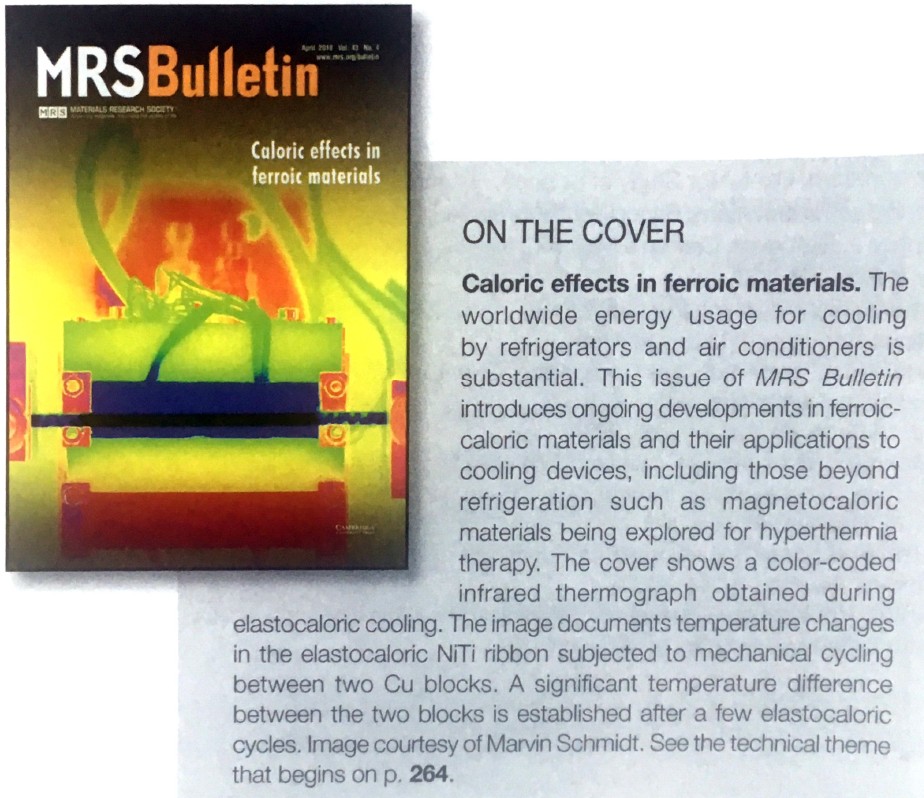The International Conference on Shape Memory and Superelastic Technologies (SMST), the leading worldwide conference and exposition for the shape memory and superelastic technologies, will be held from May 13 - 17, 2019 at The Bodenseeforum in Konstanz, Germany.
The Lab for Measurement Technology in cooperation with the intelligent Materials Systems Lab (iMSL) of Saarland University will present three contributions to the conference:
Session: Theory and Experimental Validation II
Felix Welsch, Susanne-Marie Kirsch, Nicolas Michaelis, Paul Motzki, Andreas Schütze, Stefan Seelecke: Continuous operating elastocaloric cooling device: First modeling results
 Vom 2. - 4. Dezember 2019 findet in Dresden das
Vom 2. - 4. Dezember 2019 findet in Dresden das
statt, ausgerichtet durch die Fachgruppe Mess- und Sensortechnik von Dechema und AMA.
Call for Paper (Deadline 04.09.2019)
Aktuelles zu Messtechnik & Sensorik: Smart Sensors, spezielle Einsatzumgebungen, Anwendungen in Umwelt, Medizin, Mobilität, Industrie uvm
Wie sehr Messungen unser tägliches Leben beeinflussen, zeigen die aktuellen Diskussionen zu Luftschadstoffen und daraus resultierenden Fahrverboten. Ähnlich relevant sind Sensorik und Messtechnik in den Bereichen autonomes Fahren, Medizin und Lebensmittel, aber auch im industriellen Umfeld sowie beim Smart Farming. Seien Sie beim 14. Dresdner Sensor-Symposium dabei, vernetzen Sie sich mit exzellenten Wissenschaftlern und Entscheidern aus der Industrie. Sie erhalten aus erster Hand neueste Ergebnisse aus Forschung und Entwicklung in Hochschulen und Industrie!
Mehr als 20 wissenschaftliche Vorträge und über 50 Poster erwarten die Teilnehmer. Acht Übersichtsvorträge renommierter Fachleute, u.a. von Agricon GmbH, Bayer/BASF, IBM, der PTB und den Universitäten Wien und Hannover, prägen das hochkarätige Programm u.a. mit Beiträgen zur medizinischen Relevanz von Luftqualität, zur Digitalisierung in der chemischen Industrie und zur metrologischen Verlässlichkeit von Algorithmen im Bereich Industrie 4.0.
For english see below
Der Lehrstuhl für Messtechnik bzw. die AG Messtechnik am ZeMA - Zentrum für Mechatronik und Automatisierungstechnik gGmbH präsentieren aktuelle Forschungsergebnise auf der Hannover Messe 2019 vom 1.-5. April.
Innovative Lösungen aus den Bereichen Gasmesstechnik, Signalverarbeitung/Maschinelles Lernen sowie nachhaltige Energienutzung werden präsentiert auf dem saarländischen Gemeinschaftsstand in der Forschungshalle 2, Stand B46.
Nähere Informationen entnehmen Sie bitte den folgenden Pressemitteilungen:
The Lab for Measurement Technology and the Measurement Science Goup at ZeMA (Centre for Mechatronics and Automation gGmbH) will present current research results at Hannover Fair 2019 from April 1 to 5.
Innovative solutions from our research areas gas measurement systems, signalprocessing/machine learning and sustainable energy use are presented at the Saarland booth in hall 2, stand B46.
For further information, please check the following press releases:
 Our research in the DFG priority programme Ferroic Cooling provided the cover art for the April 2018 issue of the MRS Bulletin with a focus on Caloric Effects in Ferroic Materials.
Our research in the DFG priority programme Ferroic Cooling provided the cover art for the April 2018 issue of the MRS Bulletin with a focus on Caloric Effects in Ferroic Materials.
In the issue, our research was covered in the article "High-performance elastocaloric materials for the engineering of bulk- and micro-cooling devices" co-authored by Jan Frenzel, Gunther Eggeler (both Bochum), Eckhard Quandt (Kiel), Stefan Seelecke (Saarbrücken) and Manfred Kohl (Karlsruhe).
The cover art shows an image from Marvin Schmidt´s PhD thesis entitled: "Elastokalorisches Kühlen mit Ni-Ti-basierten Formgedächtnislegierungen: Thermodynamische Analyse, experimentelle Untersuchungen, Prozessoptimierung" with our elasto-caloric cooling demonstrator: a NiTi ribbon is used to transport heat from the heat source (blue) to the heat sink (red) to achieve a significant temperature difference after only a few cooling cycles.
Open Access Journal Atmosphere
View all details - Call for papers (pdf)
Deadline for manuscript submission: January 31, 2019.
Low-cost sensor technologies are gaining increasing interest for monitoring of air quality, both in the outside air and indoors. Sensor technologies can provide comprehensive information concerning a wide range of pollutants with high spatial and temporal resolution. They thereby offer the basis for novel environmental information services, i.e. green routes through cities for bikers and joggers. However, the data quality and reliability of these sensors as well as systematic integration with fixed monitoring stations and modeling approaches remain challenging.
The Special Issue will cover a range of topics addressing modern sensor technologies, test, validation and calibration as well as practical applications including multisensor integration, uses for model validation, data fusion and data assimilation, but also for supporting environmental information services and citizen science goals. We target high quality papers on the latest technological developments as well as examples of field studies using low-cost air pollution sensors of various types and for numerous applications in ambient as well as indoor environments.
Keywords
For further information, please refer to the special issue homepage.
Guest editors
|
Prof. Dr. Ole Hertel |
Prof. Dr. Andreas Schütze |
Prof. Dr. Kostas Karatzas
|